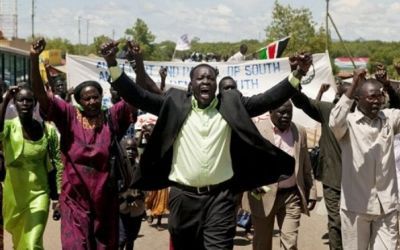Abyei community leader calls for accelerated international intervention
By Ngor Arol Garang
January 10, 2012 (JUBA) – One year on from the date that the disputed territory of Abyei was due to decide whether it would join South Sudan or remain governed by Khartoum – north of what is now a new international border – Abyei leaders have called for international intervention to resolve the issue.

However, disagreement over who could take part in the vote and who would oversee it meant that it did not go ahead. Since then the United Nations Mission in Sudan (UNMIS), which helped conduct South Sudan referendum, has pulled out country, after Khartoum refused to renew its mandate.
The north Sudanese military attacked and took control of the area in May 2011, displacing tens of thousands of civilians.
“We need their help now not tomorrow. Our people have suffered a lot”, Nyanaguek Kuol, a deputy Abyei community leader in Juba said on South Sudan TV on 9 January, the day six years ago when Abyei was accorded to right vote on its future in the Comprehensive Peace Agreement (CPA).
The agreement ended decades of civil war in which two million died but left many issues unresolved.
Fighting has broken out in South Kordofan – since June 2011 – and in Blue Nile – since August 2011 – between groups that fought with South Sudan during the civil war but now remain north of the border governed by Khartoum.
The CPA-mandated ‘Popular Consultations’ in the two northern states were never completed.
Despite a six year interim period, 80% of the border remains demarcated and there are disputes over many other issues including oil, which Abyei also produces.
Nyanaguek claimed on that the Abyei referendum did not go ahead because Khartoum did not want to resolve the issue peacefully.
Sudan insisted that the nomadic Misseriya tribe – who enter region for a few months of the year to graze their cattle – be allowed to vote, hoping that this would swing the vote in favour of remaining in the north.
Without the Misseriya it was expecting that the South Sudan-aligned Dinka Ngok would have voted to secede and become part of South Sudan.
“I believe the whole world is watching how our innocent people are dying daily under trees where they have fled when their home town was once again invaded in May by the forces of the same Sudanese government which burned it to ground in 2008 after killing a lot of people”, Nyanaguek said.
The Sudan Armed forces (SAF) have occupied Abyei since May missing a deadline to pull out of the area in September, as part of an agreement that has seen Ethiopian troops replace UNMIS.
However, contrary to the deal brokered in Addis Ababa, Khartoum says it will not begin pulling out of Abyei until the full United Nations Interim Security Force for Abyei (UNISFA) has been deployed.
By November Ethiopia had deployed just 2,780 of it 4,200 troops in Abyei and it is unclear when they will have a full contingent.
“There are no indications that they [SAF] will leave any time soon”, Nyanaguek added, calling on the international community to act.
Bol Makueng, the head of Information, Culture and Information in the secretariat of South Sudan’s ruling party – Sudan People’s Liberation Movement (SPLM) – observed that the issue needs to be peacefully resolved without prejudice to the rights of the people of Abyei.
Makueng said the problems arises each time a definition of residency in Abyei is suggested.
Sudan’s ruling National Congress Party (NCP) “remains stuck on a narrow and shallow definition” of residency “that intends to include non natives of Abyei” he said, in reference to the Misseriya.
The SPLM reject this insisting that the “Abyei belongs to the Nine Dinka Chiefdoms”, he says.
He said that the Misseriya should be able to look for water and pasture in Abyei but they did not have the right to take part in the referendum.
(ST)
